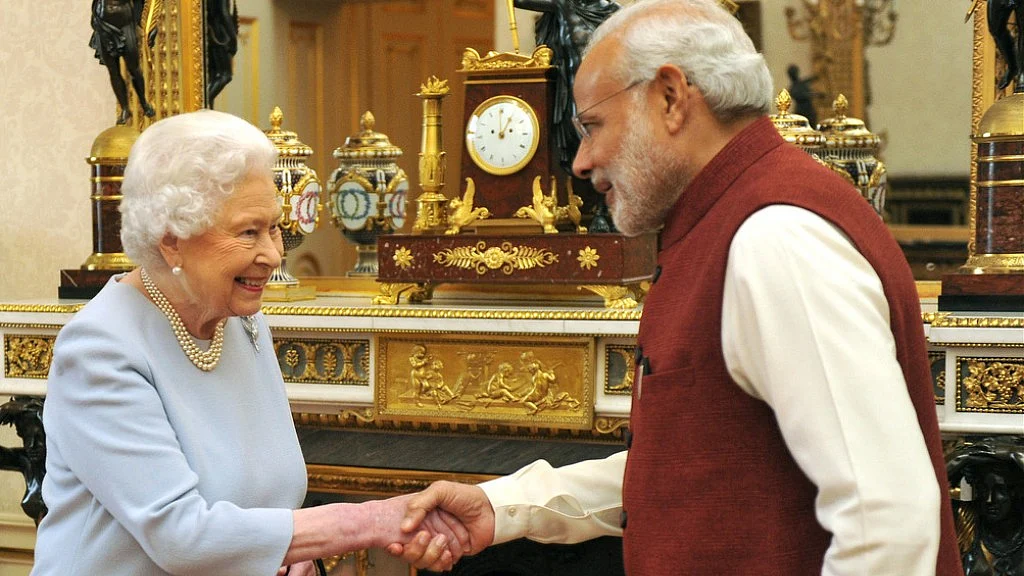CHOGM 2018: Britain wooing Modi & India- II
With British monarch Queen Elizabeth II celebrating her 92nd birthday, India ready to accept Prince Charles as successor if India and PM Modi are accorded sufficient importance

The next CHOGM will be held on 19 and 20 April in London - a summit that will witness the highest ever turnout of heads of government in the 53-nation Commonwealth's history. Queen Elizabeth will celebrate her 92nd birthday a day after the CHOGM ends.
In this scenario, while this is not being officially mentioned, a Commonwealth insider said: 'The most sensitive issue at this CHOGM, which will be dealt with at the leaders' (meaning heads of government) level - has not been dealt with at the sherpas' level - is the succession issue.' He added: 'Clarence House (euphemism from Charles' office) definitely wants this to be nailed down.'
The person further revealed: 'India has told the British Government, Buckingham Palace and Clarence House that they are quite "comfortable" with the succession happening. India won't oppose it, it will support it.' A senior Indian government official concurred with this view.
In a world where Britain's powers have receded, Charles, unlike his mother, has not been seen as an automatic choice to step into her shoes. But the practical picture perhaps makes it so.
Amitav Banerji, a respected former Director of Political Affairs at the Commonwealth Secretariat, explained: 'Prince Charles is the obvious choice to succeed his mother. In any event, I do not see another viable option, as no single head of government in the Commonwealth is likely to be accepted for the role, especially when there is already a chair-in-office (which is occupied for two years by the country that hosts a CHOGM).'
It was rumoured that Elizabeth's courtiers wanted to change the Commonwealth's constitution to make a British monarch head of the Commonwealth in perpetuity. In 1997, a committee recommended this and it was approved on the nod at the Edinburgh CHOGM. But when member nations woke up to the fact that this had been done by sleight of hand, the formulation was reversed to the original, which was that Elizabeth is head of the Commonwealth and when the time comes the leaders will decide on her successor.
Britain has been working on Narendra Modi to obtain India’s nod. First, Charles’ and daughter-in-law, William and Kate, met him in 2016. This was followed by a visit by Charles himself last year. There is, though, talk of Modi being pleased with a promise of an Ayurveda Centre in the United Kingdom.
In this day and age, India's backing is important. At the same time, Modi approving of Charles' candidature does not carry the weight Nehru's approbation of Elizabeth did. Indeed, Modi cannot carry the rest of the Commonwealth with him the way Nehru did. On the other hand, Modi may be swimming with rather than against the tide.
One wonders what the maker of the 'new' Commonwealth, Nehru, would have thought of the organisation today. Would he have allowed the association to dwindle in its relevance the way it has?
Britain wooing Modi & India
Since the heady phase of its stewardship in removing apartheid in South Africa, the Commonwealth has lost its centrality. Indeed, India has long lost interest in it, concentrating as it has on consolidating its place at the United Nations, with a permanent membership of the Security Council as its goal.
But with Britain deciding to exit the European Union and thereby risking the free trade it has enjoyed by being within its fold, Whitehall is desperate to sell an alternative to its people, who are now worried about an uncertain future. A Commonwealth trading arrangement as a substitute to the UK’s trade with the rest of the EU is misleading. So, an idea of a preferential trade and investment structure has been doing the rounds, though this does not appear to have been included in the draft communique to be issued at the end of the CHOGM, which was prepared last month at a meeting of senior officials.
The Commonwealth insider stated: “What is without question is that the home country here (meaning Britain) is going out of its way to court India and build it up as absolutely key to the future of the Commonwealth.”
He continued: “At the political level in Delhi this seems to have been embraced, probably notwithstanding the scepticism that still prevails amongst the mandarins in South Block.” It was described as the MEA “falling in line because they got a signal from up top”.
A Hindutva leaning British Indian who is said to enjoy access to Modi’s ears, advocated: ‘Anoint New Delhi as the hub of the head office of the Commonwealth trading bloc.’ But the Indian commerce ministry shot down the proposal, notwithstanding the ministry of external affairs agreeing to it. Efforts are still on, though, to get Modi to make a commitment during one of his interventions at the CHOGM.
Follow us on: Facebook, Twitter, Google News, Instagram
Join our official telegram channel (@nationalherald) and stay updated with the latest headlines